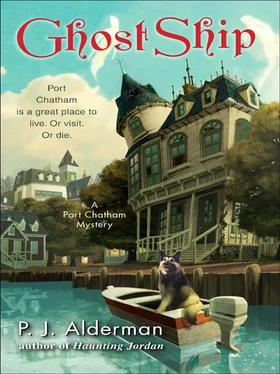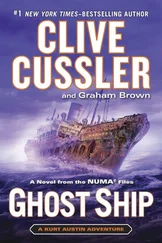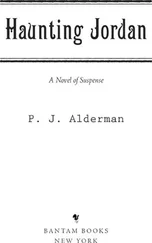As if she could get any of “her ghosts” to do anything she wanted. “Right.”
“And it would be kinda cool to help you solve an old murder, I guess.”
“Absolutely.”
He unlocked the door but kept his arm across the door-jamb, blocking her from entering. “Just don’t touch the walls, okay? The Sheetrock mud is still wet, and I don’t want to be sanding your handprints out of it.”
“Scout’s honor,” she promised. “I can lock up after myself if you’re leaving for the day.”
“Nah.” He stepped back to let her through. “I’m headed to the lumber company to pick up some extra mud. I was gonna stop for some lunch, but I’ll be back in an hour or so.”
She beamed at him. “Perfect.”
Inside, she was hit with a mildly chemical odor that tickled her nose. She hastily headed downstairs to the basement, where the Society’s archived collections were temporarily being stored during the remodel. The two elderly docents, Nora and Delia Hapley, were still on vacation in the south of France, happily avoiding the mess of the remodel. Little did they know how many times Jordan had illegally accessed their historical papers. She suspected there would be hell to pay when they found out.
She was pleased to find that the overhead lights had been turned back on—an improvement since the last time she’d visited, huddling in the dark and using her penlight to read. From memory, Jordan quickly found the stacks that contained binders of newspapers from the 1890s. Before she’d left the house, she’d checked the date of the story about Seavey’s murder, which made it easy to narrow down which binder to pull from the shelves. Her best guess was that the shipwreck had to have occurred either immediately before that article was printed, or within a few days of it. And the shipwreck would have been big news—there should be several articles about it.
Sitting down at a small desk on the back wall, she set Seavey’s papers, which she’d brought as another point of reference, aside for the moment. She opened the binder and started carefully lifting out stacks of brittle yellowed newsprint, scanning for dates and headlines. As luck would have it, she found what she was looking for in the first set of papers, spying the following banner headline, stretching across the front page:
Tragedy Strikes in Local Waters: Scores Perish as Henrietta Dale Founders on Dungeness Spit
August 5—Captain Nathaniel Williams, commander of the ill-fated clipper ship the Henrietta Dale , stood beside this reporter late last night on the west edge of Dungeness Spit, tears pouring down his ruddy cheeks as he watched the ship disintegrate, having fallen victim to powerful waves. “I’ve never skippered a finer ship,” he cried. “It breaks my heart to watch her die.”
While en route from Victoria, British Columbia, the ship mysteriously ran aground south of the New Dungeness Lighthouse. As of this reporter’s deadline, many of the crew and passengers on board have perished, though the lightkeeper, with the help of his wife, has been able to pull a few blessed souls from the icy surf.
Rescue personnel from neighboring towns—including our own Port Chatham—tried in vain to help those injured in the sudden grounding, but the precarious nature of the ship in shifting sands was a danger to all those who valiantly attempted to save lives.
Captain Williams removed his wool cap in a gesture of respect as the beautiful ship met her final death throes, her masts crashing into the surf, her hull breaking into pieces. “She was the pinnacle of my life’s work,” he said, visibly distraught. “I’ll never skipper another like her.”
Though few in number, the injured will be transported to Port Chatham to be treated at local infirmaries. Relatives of crew members and passengers can inquire as to the status of their loved ones at the Port Chatham Police Station.
Jordan set the newspaper aside, leaning back in the wooden chair she’d pulled up to the small desk. So there had been survivors. That meant there must be a list of victims in a subsequent article, as well as stories from survivors that would give her an idea of how many survived and who they might have been. It was possible she’d even run across a mention of Michael Seavey, either listed among the dead or noted as transported to the local infirmary.
She sorted through the rest of the stacks of newsprint, frustrated when she found nothing other than the article Hattie had shown her mentioning Seavey’s murder. As with many historical collections, not all issues of the old newspaper had been preserved—there were gaps in the coverage, big gaps. She had a few more issues at home, but the chances were slim she’d find what she needed there.
Dammit! Scrubbing her hands over her face, she thought about what she knew so far, which was precious little: The ship had run aground, and it was possible that Michael Seavey had survived the wreck. She’d found no mention, though, of the ship being deliberately lured off course.
If Seavey had survived, why didn’t he remember? And why weren’t there more articles about Seavey’s murder? Did the lack of stories about a formal murder investigation support his contention that Eleanor had planted the article for some reason? Surely even the murders of known criminals had been investigated in the nineteenth century. And such an investigation wouldn’t have been ignored by the newspaper, if only for the purpose of underlining Eleanor’s unyielding editorial stance regarding the evils of such activities.
Then again, Jordan supposed it didn’t matter how Seavey had died, necessarily. Because if the ship had been lured onto the rocks, someone had most likely intended to murder him. In fact, whoever that person was may have realized Seavey had survived and come back to finish the job. If she could find evidence that someone had deliberately wrecked the ship, then either way, she had a murder to solve.
She pulled herself up short. If she decided to solve it. As far as she was concerned, she’d found her answer, that she really was—alarmingly—seeing a ghost ship. The article was clear: The Henrietta Dale had broken up in the surf off Dungeness Spit that night over one hundred years ago. So Bob was correct; there was no way anyone could have refurbished the vessel.
Jordan let her mind slide away from that scary little fact and focused on murder instead. Seavey didn’t seem to care how he had died. But Hattie did . And dammit, if she were in Hattie’s place, she would feel a similar level of guilt. Hadn’t she wanted to solve her own husband’s murder, even after he’d slept around on her, dragged her name through the papers, and battled her for more than his fair share of the assets in the divorce? Admittedly, Ryland had turned out to be a major jerk, but he hadn’t deserved to die. And although Jordan had been implicated, her main motivation had been to find out who killed the man she’d once loved.
In Seavey’s case, there was no question that he had a violent past, but he’d cared enough for Hattie to avenge her murder, and he hadn’t deserved to be falsely accused. Even if Hattie eventually chose not to marry him, she would feel better if she at least helped find out what had happened to him. So Jordan had no problem empathizing with Hattie’s point of view. Unfortunately.
She felt like banging her head against the nearest brick wall. Besides Seavey, who had been on board the Henrietta Dale that night? Obviously, the crew and its captain; Bob had said that Seavey had hired a captain known to be extremely competent. Had that captain been hired locally? If so, it was possible the captain had written a memoir. After all, he would want to defend his actions that night, in case anyone wondered about his culpability.
Читать дальше












